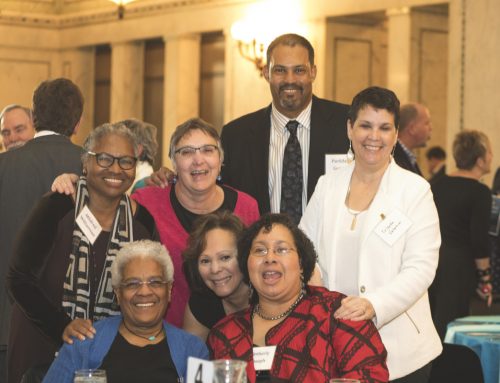Jay Risk is surrounded by boxes.
Sorting twelve years’ worth of files and packing them all is no fun, but Jay takes the experience- which to many (including myself) is a tedious task- and reframes it in true chaplain style: “Going through all these things has been a real walk down memory lane.” As he recounts a few memories for me, the most prevalent theme and detail is the way in which Bishop Anderson House’s success is in at least some part due to the teamwork of many who dedicate themselves to the work of pastoral care. “People have been so generous with their time and talents and treasure,” Jay says. “As I look back, that’s been heartwarming to see.”
It is fitting, then, that Jay names Bishop Anderson’s collaboration with Rush University’s Department of Religion, Health, and Human Values (RHHV) as one of the most important and personally transformative aspects of his tenure. It is from this collaboration that Jay sees the future of chaplaincy growing, especially as chaplaincy transforms into an outcomes-oriented and research-informed field. Jay’s work with George Fitchett at Rush resulted in the publication of a Spiritual Screening tool meant to aid members of the healthcare team in identifying a patient’s spiritual distress. The tool markedly increased the number of referrals to chaplains at Rush, and Jay suggests that the evidence of pastoral care’s positive effects provided by tools like Spiritual Screening is at the core of future chaplaincy.
As he speaks about his experience researching with Fitchett and other members of RHHV at Rush, Jay reflects on the ways that these collaborations have personally effected him, too. “I am deeply grateful for, aware of, and have been changed by the extraordinary people I’ve worked with here,” he says. “Rush, with the Department of Religion and Health, has been such an enriching and life-changing experience for me. I’ve done things I never would have done before. I’ve learned an extraordinary amount here and been able to teach and share it with other people.”
In addition to the need for chaplaincy to become evidence-based and outcomes-oriented, Jay also anticipates that the growing interfaith nature of pastoral care will continue its move to the forefront of chaplaincy. “I think chaplains will need to be versed in a new language of spirituality,” he says. He emphasizes a necessary balance between personal tradition and broader faith; denominational affiliation will not (and should not) disappear entirely. “They need to be grounded in their own faith tradition, but they also need to be grounded in a language that reaches across faith traditions and religions to the human experience.”
This respect for the human experience thrives at the heart of Jay’s own ministry and approach to chaplaincy. In the many conversations we have had over the course of our time working together, Jay repeatedly speaks of the desire of the human heart to connect with the divine, especially in times of crisis or distress. “All of the things we do are about that,” Jay says. “It’s about seeking the transcendent as a source of hope and strength and courage when things aren’t going well.” In his work as a chaplain, and as the Executive Director of Bishop Anderson House, Jay demonstrated an exceptional ability to come alongside his patients in that yearning.
As our conversation draws to a close, I ask Jay a final question: what’s next? When he begins to speak of post-retirement plans, Jay lights up. He names a slew of activities: fly fishing, gardening, woodworking, traveling with his wife, Paula. Jay also speaks about the ways in which his ministry will continue to grow. “I just got off the phone with the police chief of Park Ridge, and he’s coming to an action of United Power around two issues: gun violence and the incarceration of the mentally ill. I’ll continue my work with United Power and do some additional training. I’d like to invite other clergy and denominations to a deeper involvement with United Power, exercising faith in that way.” Jay also plans to continue exercising his priestly ministry in a congregational setting. It is obvious that Jay will find new ways to seek and connect with the Divine as he journeys on the newest chapter of his life.
And what’s next for us? Well, all those who he has taught, touched, and loved will continue the legacy of good work that Jay champions every day.





Leave A Comment